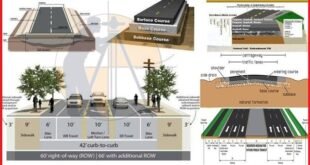Thumb Rules For Civil Engineers In Building Construction
Thumb Rules For Civil Engineering is essential for any Civil Engineer, Site Engineers, or Civil Supervisor. They play a crucial role while taking quick decisions on site. There is some Civil Engineering Basic Knowledge that every Civil Engineers must know about this Riles.
The Thumb Rule of Civil Engineering or the thumb rule for construction helps you in finding out the solution using a simple mathematical formula & make smart decisions whenever needed.
But while using these thumb rules, u must remember that the thumb rule never gives the exact or accurate results, u just have used them for approximate results
There is a number of Thumb Rule For Civil Engineers that we used in construction work. So the following are some most frequently used Thumb rules on the Construction site.
The Thumb rule method is an approximate & comparing method. In thumb rules & the units are not the same when we compare to get the results. So ignore units while performing the thumb rule.

1. Thumb Rules for Civil Engineering In Construction
Following are thumb rules in Civil Engineering
1. Thumb Rule for Concrete Volume
The volume of concrete required = 0.038 m3/square feet area
Example:-If Plan Area = 40 x 20 = 800 Sq. m.
So, for the plan area of 800 Sq. m. the area the total volume of concrete required
= 800 x 0.038m3 = 30.4m3
Learn More
What Is Difference Between Pre-tension And Post-tension
2. Thumb Rule for Steel Quantity for Slab, Beams, Footings & Columns
Following are some Important thumb rules for Steel Calculation for Slab, Beam, Column, and Footings.
Steel required in residential buildings = 4.5 Kgs – 4.75 Kgs / sq. Ft.
Steel required For Commercial buildings = 5.0 Kgs-5.50 Kgs/Sq. Ft.
You can also use BN Data Recommendations for the more accurate result,
The following recommendations Thumb Rules For Civil Engineering are given in B N Data for the Steel quantity used in different members of the building.
3. Percentage of Steel in Structural Members
Following are thumb rules for reinforcement in concrete members,
1) Slab – 1% of the total volume of concrete (Slab steel calculation thumb rule)
2) Beam – 2% of the total volume of concrete
3) Column – 2.5% of total volume of concrete
4) Footings – 0.8% of the total volume of concrete
Example:-
How to calculate the steel quantity of slab having the Length, width, and depth of the slab is 5m x 4m x 0.15m
Learn More
-
How Many Types Of Septic Tanks Based On Materials
-
How To Estimate Per Meter Weight Of Reinforcing Steel Bar
-
How To Calculate The Cutting Length Of Circular Stirrup
Step 1: Calculate the Volume of Concrete:
The Total Volume of Concrete for given Slab = 5 x 4 x 0.15
= 3m3
Step 2: Calculate The Steel Quantity Using Formula:
As per the guidelines are given in the BN Dutta reference book the steel quantity of slab is 1% of the total volume of concrete utilized.
Thumb rule to estimate Steel quantity of above slab = Volume of Concrete x Density of Steel x % of Steel of Member
Steel weight required for above slab = 3 x 7850 x 0.01 = 235Kgs
For accurate estimation, you can refer to Bar Bending Schedule
4. Thumb Rules For Shuttering Work
Shuttering costs are taken as 15-18% of the total construction of the building. Shuttering work is done to bring the concrete in Shape. The Thumb rule to estimate the shuttering required is 6 times the quantity of concrete or 2.4 times of the Plinth area.
For example, the concrete quantity is 0.5m3, then
Area of Shuttering is 0.5 x 6 = 3m2
Components of Shuttering
Shuttering Ply Quantity estimation
The Shuttering plate Ply, Battens, Nails are components of Shuttering.
Suppose, The Shuttering Ply has a length, width & depth of 2.44 x 1.22 x 0.012
The No. of Shuttering Ply Sheets = 0.22 times of Shuttering
Suppose, the Shuttering Area = 3m
Then Ply required for shuttering = 0.22 x 3 = 0.66m2
5. Battens Quantity Calculation
Shuttering Batten usually has a length & width of 75mm x 40mm.
Batten Quantity = 19.82 x No. of Ply Sheets
If work requires 25 Ply sheets, the total quantity of Battens are 19.82 x 25 = 495 Battens
Nails & Binding Wire Quantity in Shuttering:
Approximately, 75 grams of Nails were used in the shuttering of the 1m2 area.
75gms of Binding wire is used for every 1m2 of Shuttering.
Thumb rule for Shuttering oil estimation :
Shuttering oil is applied on the shuttering plate surface used to de-frame or de-assemble from the concrete easily.
Total required Shuttering oil = 0.065 x Total Area of Shuttering
(or)
For every 15m2 of shuttering 1 liter of shuttering oil is consumed.
Example :-
If, total area of shuttering is 15 m2, then Shuttering oil Consumption = 0.065 x 15 = 0.975.
6. Thumb Rule for Cement, Sand, Coarse Aggregate Quantity Calculations
Note: 1 bag of cement = 50Kgs
Thumb rule for Cement required in Brickwork, Cement Masonry & Plastering work in construction.
Learn More
-
How To Calculate The Cutting Length Of Stirrups In Beam And Column
-
How to Calculate Staircase Concrete & Bar Bending Schedule And Staircase Reinforcement Details
-
Cutting length Determination Of a Spiral Or Helix Bar
-
What is crank Length of reinforcement
-
How do you take off a Staircase
7. Thumb Rules For Civil Engineers for Brickwork
following are Thumb Rules for civil engineering for brickwork and cement quantity calculations.
| Brickwork for 1m3 | Cement Qty in m3 | Cement Qty in Bags |
| 230 mm Brickwork | 0.876m3 | 25.4 Bags |
| 115 mm Brickwork | 0.218m3 | 6.32 Bags |
8. Thumb Rules For Cement Masonry Quantity
| Cement Masonry Type & Mix | Cement Qty in Bags | Cement Qty in Kgs |
| 200mm in Cement Masonry work of Ratio 1:6 |
0.124Bags/m2 | 6.2Kgs/m2 |
| 150mm in Cement Masonry work of Ratio 1:6 |
0.093Bags/m2 | 4.65Kgs/m2 |
| 200mm in Cement Masonry work of Ratio 1:4 |
0.206Bags/m2 | 10.3Kgs/m2 |
| 150mm in Cement Masonry work of Ratio 1:4 |
0.144Bags/m2 | 7.2Kgs/m2 |
| 100mm in Cement Masonry work of Ratio 1:4 |
0.103Bags/m2 | 5.15Kgs/m2 |
8. Thumb Rules Plastering Quantity
| Type of Plastering | Cement Qty in Bags | Cement Qty in Kgs |
| Rough Plastering | 0.09 Bags/m2 | 4. 5Kgs/m2 |
| Internal Wall Plastering | 0.09 Bags/m2 | 4.5 Kgs/m2 |
| Duct Plastering | 0.09 Bags/m2 | 4.5 Kgs/m2 |
| External Wall plastering | 0.175 Bags/m2 | 8.75 Kgs/m2 |
| Stucco Plastering | 0.175 Bags/m2 | 8.75 Kgs/m2 |
| Lathen Plastering | 0.55 Bags/m2 | 27.5 Kgs/m2 |
How do you calculate the steel by thumb rule ?
Following are Thumb Rule for reinforcement steel in concrete members,
1) Slab – 1% of the total volume of concrete (Slab steel calculation thumb rule)
2) Beam – 2% of the total volume of concrete
3) Column – 2.5% of the total volume of concrete
4) Footings – 0.8% of the total volume of concrete
What is a good rule of thumb ?
Thumb Rule can be called a guideline, idea, or principle that helps you make quick decisions. “Arrive early” is an efficient good Thumb Rule for most appointments. It referred to builders who frequently use their thumb to estimate measurements. It is a helpful rule even being inexact.
What is the basic knowledge of Civil Engineering ?
1. Lapping in reinforcement is not allowed for the bars having diameters more than 36 mm.
2. Steel Char maximum spacing is 1.00 m (or) 1 No per 1m2.
3. In steel dowels, a rod minimum of 12 mm diameter should be used.
4. Steel Chairs minimum of 12 mm diameter bars to be used.
5. Longitudinal reinforcement should not be less than 0.8% and more than 6% of gross C/S.
6. The minimum bars used for a square column are 4 No’s and 6 No’s for the circular column.
Learn More
What is the thumb rule to determine beam depth ?
The method for determining the width-depth ratio of reinforced concrete beams is not specifically given in codes. However, a thumb rule can be used i.e. taking depth that is two and a half to three times the beam’s width. For long-span beams, it is generally economical to use deep and narrow sections.
Thumb Rules For Civil Site Engineer
Thumb Rules For Civil Engineering is essential for any civil engineer, Site engineer, or civil supervisor. They play a crucial role while taking quick decisions on site. There is some civil engineering basic knowledge that every civil engineer must know.
Thumb rule requirement of standard materials and standard calculation in high raised building
Steel =3 to 5 kg / sqft.
Cement =0.5bags/ sqft.
RMC =0.05 m3/sqft.
Block =12.5 nos /sqm.
Electrical cast = Rs 133/sqft.
Plumbing cost = Rs 126/sqft.
Fire fighting cost = Rs 40/sqft.
External development = Rs 94.5/sqft.
Thank you for going through this article. Have a good day
To get more information, Visit Our Official website
Land Surveying & Architects
JOIN US & LIKE OUR OFFICIAL FACEBOOK PAGE
THANKS.
 Surveying & Architects A unique platform of Civil Engineering
Surveying & Architects A unique platform of Civil Engineering
